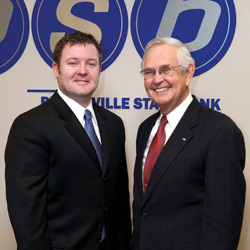
In an age when stories of failing banks and lending institutions are commonplace, some are finding ways to survive and even grow in the current financial climate. Two years ago, iBi interviewed Andrew Black, president and CEO of Princeville State Bank, and since then, he has seen his business thrive in a down economy, all while remaining focused on the customer.
Despite the "bigger is better" mentality adopted by many financial institutions, smaller banks are doing well in this economy. When the "too-big-to-fail" institutions invested in risky loans, Princeville State Bank chose not to. For years, as the large banks hastily expanded—making billions in the process—Princeville State Bank took the prudent path. Today, Black wouldn't trade places with any of those banks that survived, in large part, due to government assistance.
The conservative practices employed at Princeville State Bank have paid off. The tables have turned, and smaller banks across the country are the ones thriving now. "By design, community banks have always been a lot more conservative in their lending practices, because they're locally owned," says Black. But make no mistake; this is no mere mom-and-pop operation. Currently, the bank is roughly a $70 million institution, and he hopes to double its size over the next seven to 10 years.
Black is proud of the bank's current situation. "We get calls all the time from people saying ‘Hey, we want to buy your foreclosed homes.' But at this point in the game, I think we have one pending foreclosure right now. We haven't had one, probably, in the last 24 or 36 months. We're ahead of budget."
The bank was originally founded in Princeville in 1950 by Black's great-grandfather and has been handed down through the family. A second location was built in Peoria several years ago, but Princeville State Bank remains a family-owned enterprise, with Black's wife, mother and grandfather all working for the business. His grandfather, now nearly 80 years old, remains chairman of the board, his mother works as a courier picking up deposits from businesses around the area, and his wife is the internal auditor and vice president.
That kind of personal touch is what Black believes sets them apart. He is also quick to note that on top of customer service, Princeville State Bank is a full-fledged investment bank, mortgage office, and insurer for long-term care, and it offers many of the same technical services as larger banks, such as online banking and messaging capabilities.
Being a smaller bank has its challenges. Because it lacks backing by a corporate headquarters, it can really limit the loans they accept. Yet Black believes that a smaller staff and resources are worth not having to deal with corporate red tape. Decisions and policy changes are made within the offices, so Black says the bank has a much faster turnaround time than the larger, more bureaucratic institutions.
Black attributes much of the bank's success to the rapport his family has built with its clients. "When I started here just over 14 years ago, it was all about building relationships; it wasn't ‘okay, let's try and make a buck here; let's try and make a buck there.' It's really trying to help individuals...achieve their dreams, from buying that first bicycle to buying their first car to buying their first home."
Black believes that the safety of small, locally owned banks will continue to draw customers and plans to continue to steadily grow the company his grandfather started over 50 years ago. iBi

